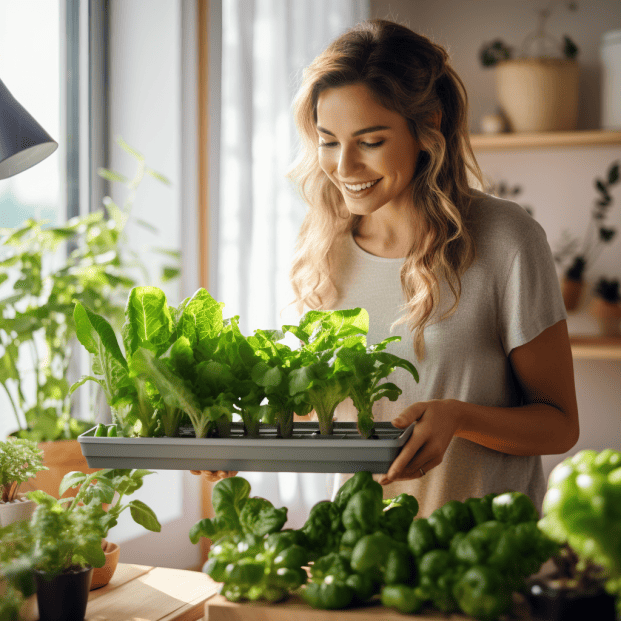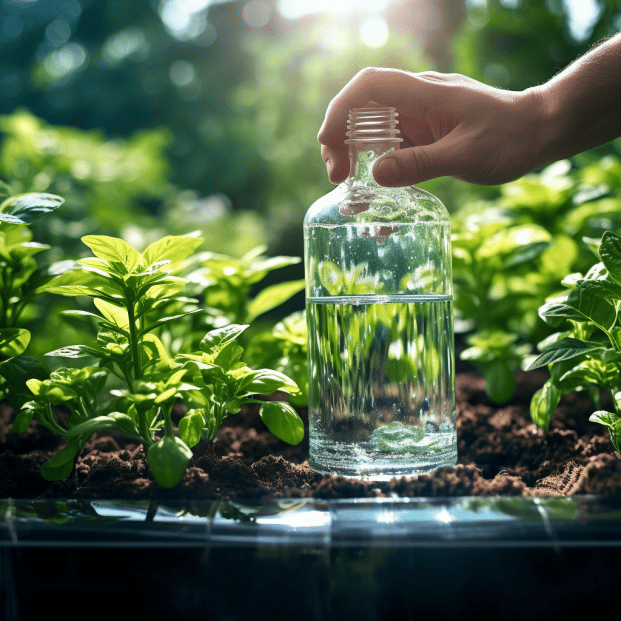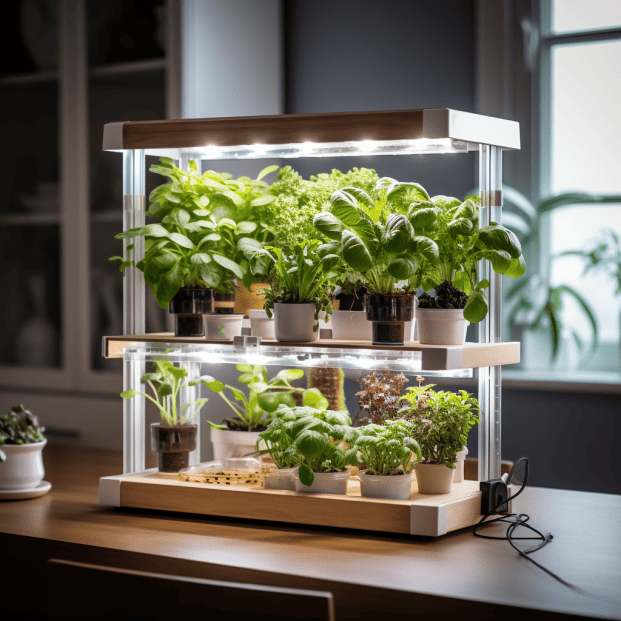Hey there! Choosing the right plant food can be tricky when you’re just starting out with hydroponics.
But don’t sweat it! I’m here to make it simple.
With my handy tips, you’ll be able to whip up the perfect liquid meals for your crops.
You see, I’ve been growing plants without soil for over 10 years.
I’ve made every mistake in the book! By learning from my slip-ups, I can help you avoid the same pitfalls.
From picking the right nutrients to mixing up your first reservoir, I’ll walk you through it step-by-step.
No need to be intimidated by all those bottles of chemicals!
In this guide, we’ll start by looking at the main ingredients plants need to thrive.
Then, we’ll make an easy starter recipe you can begin using right away.
I’ll also share my proven method for keeping your system humming along with minimal effort.
Who doesn’t love low maintenance gardening?
Growing hydroponically lets you become a wizard with plants – but only if you know the secrets! By the end of this guide, you’ll be able to monitor and adjust your nutrient solution like a pro.
Just imagine how proud you’ll feel showing off your first bountiful harvest!
I’m pumped to get growing with you! But before we start mixing nutes, here’s a fair warning…
While it may seem complicated at first, following my advice in this guide is vital for your plants.
Skip steps, and you’ll likely end up with spindly, unhealthy greens.
We don’t want that! By sticking with me, though, you can grow crops that will be the envy of all your gardening neighbors.
So, are you ready to become a hydro hero? It’s time to master plant nutrition and unlock a thriving indoor garden! Let’s get growing.
KEY TAKEAWAY
What hydroponic solution for beginners?
For beginners in hydroponics, choosing the right hydroponic solution is crucial. (1)
Opt for user-friendly, pre-mixed nutrient solutions to simplify the process and set yourself up for success.
Hydroponics 101: The Core Nutrients Plants Need to Thrive
The core nutrients plants need to thrive in hydroponics are oxygen, water, and essential minerals.
In a hydroponic system, these nutrients are delivered directly to the plant’s roots through a water-based solution.
As a beginner in hydroponics, understanding the importance of these nutrients is crucial for successful plant growth.
Oxygen is essential for root respiration and nutrient absorption.
It is supplied to the roots through oxygenation techniques like air stones or aeroponic systems.
Enough oxygen promotes healthy root development and prevents root rot.
Water acts as a medium for nutrient delivery and supports various processes within the plant.
It provides hydration, aids nutrient uptake, and helps maintain temperature stability in the system.
Essential minerals include macronutrients like nitrogen (N), phosphorus (P), potassium (K), calcium (Ca), magnesium (Mg), and sulfur (S).
These elements are required in large amounts by plants for growth and development.
Additionally, micronutrients like iron (Fe), manganese (Mn), zinc (Zn), copper (Cu), boron (B), molybdenum(Mo) are needed in smaller quantities but are equally important for overall plant health.
Properly balanced nutrient solutions provide all these essential elements to meet the specific needs of different plants at different stages of growth.
Monitoring pH levels and adjusting nutrient concentrations regularly ensures optimal conditions for plant growth in hydroponics.
Creating Your First Nutrient Solution: Guidelines for Beginners

Start by following these guidelines to create your first nutrient solution for hydroponics.
As a beginner in hydroponics, it’s essential to understand the importance of providing plants with the right balance of nutrients. (2)
- Hydroponic solutions are specifically formulated to meet the nutrient needs of plants grown without soil. The nutrient composition and concentration will vary depending on the type of plant you’re growing and its growth stage.
- To begin, choose a reputable brand that offers pre-mixed hydroponic nutrients designed for beginners. These products often come with detailed instructions on how to mix and use them effectively. When creating your nutrient solution, it’s crucial to measure accurately and follow the recommended dosage provided by the manufacturer.
- The ideal nutrient composition consists of three main elements: nitrogen (N), phosphorus (P), and potassium (K). These macronutrients play vital roles in plant growth, such as promoting leaf development, root formation, and fruit production.
- Maintaining proper pH levels between 5.5-6.5 is essential for optimum nutrient uptake by plants. Regularly monitor your solution’s pH using a pH meter or test kit and adjust accordingly.
Choosing the Best System: Low-Maintenance Hydroponics for Novices

As a novice in hydroponics, you’ll want to consider low-maintenance systems when choosing the best option for your garden.
Hydroponics is a method of growing plants without soil, using a nutrient-rich hydroponic solution instead.
For beginners, it’s important to start with a system that requires minimal effort and attention.
One popular low-maintenance system for beginners is the Deep Water Culture (DWC) system.
In this system, plants are suspended in net pots above a reservoir filled with the hydroponic solution.
An air pump oxygenates the solution, providing essential nutrients and water directly to the plant roots.
Another option is the Nutrient Film Technique (NFT) system, which involves a shallow channel where a thin film of nutrient-rich solution flows over the roots of the plants.
This constant flow provides nutrients while also promoting oxygenation and preventing root rot.
Both these systems require little maintenance once set up properly.
Regular monitoring of pH levels and nutrient concentration is necessary to ensure optimal plant growth.
Monitoring and Maintaining Ideal Conditions for Healthy Growth
Once you have set up your low-maintenance hydroponic system, it’s important to regularly monitor pH levels and nutrient concentration for optimal plant growth.
In hydroponics, the nutrient solution is the lifeblood of your plants, providing them with all the essential elements they need to thrive.
Monitoring these levels ensures that your plants are receiving the right balance of nutrients at all times.
- To monitor pH levels, you will need a pH meter or test kit specifically designed for hydroponics. This will allow you to measure the acidity or alkalinity of your nutrient solution. The ideal pH range for most hydroponic crops is between 5.5 and 6.5.
- In addition to pH monitoring, it is crucial to keep an eye on nutrient concentration. As plants uptake nutrients from the solution, their concentration can decrease over time. Regularly checking and adjusting nutrient levels will ensure that your plants receive a consistent supply of essential elements.
Maintaining proper pH and nutrient concentrations may require periodic adjustments using appropriate additives or solutions.
These adjustments will help create an optimal growing environment for your plants.
Readymade Solutions: Beginner-Friendly Hydroponic Nutrient Kits
To simplify your monitoring and maintenance process, you can try using beginner-friendly nutrient kits that are already prepared for your hydroponic system.
These nutrient kits are designed specifically for beginners in the field of hydroponics, providing them with an easy and convenient way to ensure their plants receive the necessary nutrients for optimal growth.
These readymade nutrient kits contain pre-mixed solutions that are carefully formulated to meet the specific needs of different types of plants at various stages of growth.
By following the instructions provided with the kit, beginners can easily prepare and administer the correct amount of nutrients to their hydroponic system.
These beginner-friendly nutrient kits not only simplify the process but also ensure that plants receive a well-balanced diet throughout their growth cycle.
This helps to promote healthy root development, vigorous vegetative growth, and abundant flowering and fruiting.
Identifying and Correcting Nutrient Deficiencies in Your Plants
Identifying and correcting nutrient deficiencies in your plants can be challenging, but with the right knowledge and tools, it’s possible to ensure they receive the proper nourishment for optimal growth.
In hydroponics, where plants are grown without soil, it becomes even more crucial to monitor their nutrient intake.
A well-balanced hydroponic solution is essential to provide all the necessary nutrients for your plants’ development.
- When it comes to identifying nutrient deficiencies in hydroponic plants, there are some common signs you should look out for. For example, yellowing or browning of leaves can indicate a lack of nitrogen, while stunted growth may be a result of insufficient phosphorus. Calcium deficiency often manifests as distorted or necrotic leaf tips and edges.
- To correct these deficiencies, beginners need to understand the specific needs of their plants and adjust their hydroponic solution accordingly. This involves adding the appropriate nutrients in the required amounts based on the symptoms observed. Regular monitoring of pH levels is also important as nutrient uptake can be affected by imbalances in acidity or alkalinity.
Going Organic: Options for Natural Nutrient Sources in Hydroponics
If you’re interested in going organic with your hydroponic setup, there are several natural nutrient sources available for you to explore.
When it comes to hydroponics, the nutrient solution is crucial for the growth and health of your plants.
For beginners who want to take an organic approach, there are a few options that can provide all the necessary nutrients without the use of synthetic chemicals.
One popular option is compost tea.
This nutrient-rich liquid is made by steeping compost in water and then straining out any solid particles.
Compost tea contains a wide range of beneficial microorganisms and nutrients that can greatly enhance plant growth.
Another natural nutrient source is seaweed extract.
Derived from seaweed or kelp, this solution is packed with trace minerals, vitamins, and plant hormones that can stimulate root development, improve overall plant health, and increase yield.
For those looking for a more sustainable option, worm castings can be used as a natural fertilizer in hydroponics.
Worm castings are rich in organic matter and contain beneficial microbes that help break down nutrients into forms readily available for plants.
Conclusion
In conclusion, hydroponics is an exciting and accessible way to grow plants without soil.
By understanding the core nutrients that plants need to thrive, creating a nutrient solution tailored to their needs, and choosing a low-maintenance system, beginners can easily embark on their hydroponic journey.
Monitoring and maintaining ideal conditions will ensure healthy growth, while ready-made nutrient kits provide convenience for novices.
Identifying and correcting nutrient deficiencies is crucial for plant health, and exploring organic options and hydroponic supplies adds another dimension to this innovative gardening method.
So dive in, let your plants flourish, and watch your hydroponic garden bloom like a metaphorical bouquet of possibilities!
References
- https://www.nosoilsolutions.com/4-best-nutrient-regimens-for-hobby-hydroponics/
- https://scienceinhydroponics.com/2010/07/preparing-your-own-hydroponic-nutrients-a-complete-guide-for-beginners.html
Related Articles
- https://tophydroponicgarden.com/easiest-hydroponic-system/
- https://tophydroponicgarden.com/hydroponic-supplies-basics/
- https://tophydroponicgarden.com/can-i-make-my-own-hydroponic-nutrient-solution/
Was this helpful?

Crystal Erickson is an agriculture enthusiast and writer with a passion for sustainable farming practices and community development. Growing up on a family farm in rural Iowa, Crystal developed a love for the land and a deep appreciation for the hard work and dedication required to make a farm successful.
After completing a degree in Agriculture and Environmental Science from Iowa State University, Crystal began her career as an agricultural journalist, covering stories and issues related to modern farming practices, crop management, and livestock production. She quickly established herself as a respected voice in the industry, known for her insightful reporting and thoughtful analysis.
Over the years, Crystal has written for a variety of publications, including Farm Journal, Successful Farming, and Modern Farmer, as well as contributing to several academic journals focused on sustainable agriculture and community development. Her work has been recognized with numerous awards, including the Iowa Farm Bureau’s Young Farmer Achievement Award and the National Association of Farm Broadcasting’s Farm Broadcaster of the Year.


